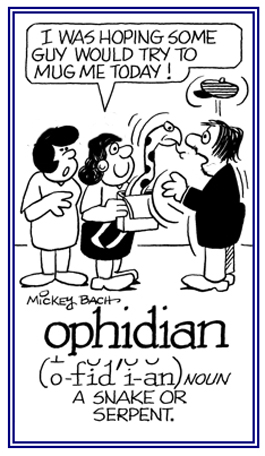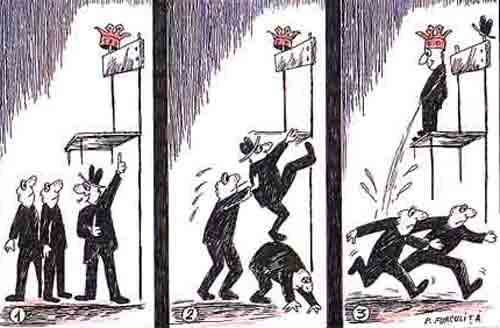-ian +
(Latin: suffix form of -an from -ianus, a modifier of the main word to which it is attached: belonging to, coming from, being involved in, or being like something)
Appearing in such words as comedian, egalitarian, Bostonian, Italian, Smithsonian, mathematician, Alabamian, Californian, Arizonian, and Canadian. It is attached to the root of common or proper nouns with the meanings "of, pertaining to, from", or "like" the proper name appearing in the stem.
median
1. In statistics, a quantity, term, or value that is the midpoint of a set of values; such that the variable has an equal probability of falling above or below it.
2. The middle term of a discrete series arranged in order of magnitude; or, if there is no middle term, the mean of the middle two terms.
3. Situated in a middle or intermediate position; middle; intermediate; neutral.
4. In anatomy, zoology, and botany; in the middle of a body, part, or organ; central, between others; specifically, designating structures in the middle of the anterior aspect of the human forearm.
5. Situated in or directed towards the median plane of a body, organ, or limb.
6. In surgery, designating a surgical incision or procedure made through the midline of the body or over or through the midline of a tumor, organ, etc.
2. The middle term of a discrete series arranged in order of magnitude; or, if there is no middle term, the mean of the middle two terms.
3. Situated in a middle or intermediate position; middle; intermediate; neutral.
4. In anatomy, zoology, and botany; in the middle of a body, part, or organ; central, between others; specifically, designating structures in the middle of the anterior aspect of the human forearm.
5. Situated in or directed towards the median plane of a body, organ, or limb.
6. In surgery, designating a surgical incision or procedure made through the midline of the body or over or through the midline of a tumor, organ, etc.
Someone who arranges and manages funerals; an undertaker who is trained to care of the dead: Jim's uncle is a mortician whose business is to be responsible for burials and cremations of those who have died.

© ALL rights are reserved.
Go to this Word A Day Revisited Index

Go to this Word A Day Revisited Index
so you can see more of Mickey Bach's cartoons.
octogenarian
1. A person who is in her/his eighties.
2. A person who is eighty to eighty-nines years old.
2. A person who is eighty to eighty-nines years old.
A reptile belonging to the Ophidie, which is scaly, limbless and elongated; a serpent: Janet had an interest in ophidians as a result of learning about them in her biology class and she even had a terrarium, or a glass container, at home with two garter snakes in it.

© ALL rights are reserved.
Go to this Word A Day Revisited Index

Go to this Word A Day Revisited Index
so you can see more of Mickey Bach's cartoons.
1. In ancient Rome; originally, a member of any of the ancient Roman citizen families; later, a member of the nobility; the opposite of plebeian.
2. A person of high rank in some medieval Italian republics and in certain free cities of the German Empire.
3. Any person of high social rank; aristocrat.
2. A person of high rank in some medieval Italian republics and in certain free cities of the German Empire.
3. Any person of high social rank; aristocrat.
pedarian
Applied to Roman senators of an inferior grade, who had no vote of their own, but could merely signify their assent to that of another; pedarii senatores.
In antiquity, those senators who signified their votes by their feet, not their tongues; that is, such as who walked over to the side of those whose opinion they approved of, in divisions of the house.
pedestrian
1. On foot, going or walking on foot; performed on foot; of or pertaining to walking.
2. Representing a person on foot, as distinguished from equestrian.
3. Applied to plain prose as opposed to verse, or to verse of prosaic character; hence, prosaic, commonplace, dull, uninspired; colloquial, vulgar.
2. Representing a person on foot, as distinguished from equestrian.
3. Applied to plain prose as opposed to verse, or to verse of prosaic character; hence, prosaic, commonplace, dull, uninspired; colloquial, vulgar.
physiatrician
A physician who specializes in physiatry (rehabilitation medicine).
physician
1. Someone who is qualified and licensed to practice medicine; a medical doctor.
2. A doctor who practices general medicine with diagnoses and treatments of diseases and injuries using methods other than surgery.
3. A person who heals or exerts a healing influence.
2. A doctor who practices general medicine with diagnoses and treatments of diseases and injuries using methods other than surgery.
3. A person who heals or exerts a healing influence.
piscitarian
A fish monger or one who sells fish.
planetarian
1. Belonging to or connected with a planet or planets; planetary.
2. An astrologer.
3. An inhabitant of a planet.
2. An astrologer.
3. An inhabitant of a planet.
platitudinarianism
A condition in which a person is characterized by platitudes; that is, addicted to the use of platitudes or pointless, unoriginal, or empty comments or statements made as though they were significant or helpful.
plebian, an alternative spelling of plebeian
1. Belonging to, or pertaining to, the common people.
2. A reference to, or belonging to, the ancient Roman plebs.
3. Common, commonplace, or vulgar; such as, a plebian or a plebeian joke.
2. A reference to, or belonging to, the ancient Roman plebs.
3. Common, commonplace, or vulgar; such as, a plebian or a plebeian joke.
A person who is active in campaigns for or holds a position in governmental authority or power: "Apparently there are some politicians who are more interested in gaining advantages for themselves than they are for their voters."

There are some politicians who betray the citizens
"Some politicians are seekers or holders of a public office who are too often more concerned about winning favor or retaining power than about maintaining principles."
A political war is one in which everyone shoots from the lip.

There are some politicians who betray the citizens
who have helped them gain political power.
1. A member of the poorest class of a community: A proletarian is without capital or regular employment and usually one who does manual labor.
2. Etymology: from Latin proletarius, "citizen of the lowest class"; in ancient Rome, people without property who were exempted from taxes and military service, and who served the state by having children; from proles, "offspring, progeny".
2. Etymology: from Latin proletarius, "citizen of the lowest class"; in ancient Rome, people without property who were exempted from taxes and military service, and who served the state by having children; from proles, "offspring, progeny".


